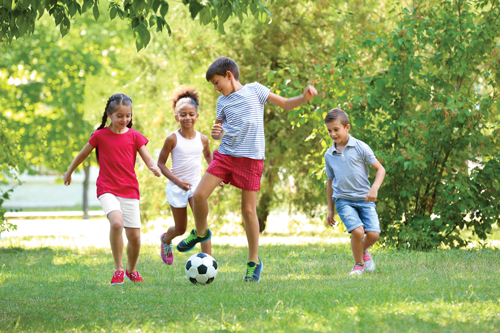
Many of our children already partake in some form of sports, with over 90% of children between five and 16 years old consistently being involved with sport, whether this be participating in the annual school sports day or an after-school activity. But did you know there are many other added benefits to your children doing sport?
Alongside improving fitness among the young, sport can also be beneficial for the mental wellbeing and growth of your children. Here, Suso explore five ways your child can benefit from taking part in sporting activities.
Sport helps to improve mental health
The physical benefits of sport are undisputed, but did you know that sport can actually help your children improve and manage their mental health better? Children who are active tend to have a better outlook on life. They are also better at managing mental health issues including anxiety and depression. This is due to the release of endorphins during exercise.
Team sport is recognised as being the best for your child’s mental wellbeing. While children with attention difficulties might find that individual sports are more helpful, on average, team sport is the best for improving your child’s mental health.
Children will become more resilient
Making sure your children are prepared for whatever they might face in the future is a large part of your role as a parent. Encouraging them to partake in sport can actually help build resilience within your children from a young age. Children who participate in sport are better equipped to handle obstacles in the future, with sport being identified as a key factor in young children’s resilience.
Whether it is finding a tactic when the other team has an advantage, or improving play when another player gets injured, the obstacles which can occur in team sports means that children can learn and better understand flexible ways of thinking. This will also give children the chance to handle disappointment better as they develop a good sportsmanship way of thinking.
Your children will develop their skills
In fact, there are a host of skills which your child can learn through taking part in sports activities. Not only will they be resilient, but their communication skills can also be developed through team sport. Sport encourages your children to speak on many levels – not only to their peers and teammates, but also to coaches and the opposition.
Other skills your child can develop through sport include:
• Leadership
• Responsibility
• Problem solving
• Teamwork
• Co-ordination
Improvements in behaviour
The benefits don’t just apply on the playing field – you might see an improvement in your child’s behaviour both at home and in the classroom too. By participating in sport, your child will likely learn respect for others, authority figures and their peers. It has also been shown that PE can help your child learn key skills such as self-discipline and concentration which can help in the classroom significantly.
There is a boost in confidence
Finally, your children can benefit from a boost in confidence due to being active in sport programmes. Physical activity can bring about a mindfulness in your children that allows them to be ‘in the zone’. This concentration means that intrusive thoughts, such as self-doubt, are forgotten – leading your child to be more confident in their decisions.
Children who have higher levels of confidence and self-esteem tend to do better in school, at home and with friends. Whereas a child with low self-esteem might repeatedly be unsure of themselves and doubt their abilities – halting progression.
The physical benefits of sport aren’t the only advantages your child can have from partaking in football, cross country, and other physical activities. In fact, UNICEF claims that children who participate in sport and play tend to do better academically as their development and learning are enhanced. The hidden benefits of physical activity can set your child up for success in the future as they develop key skills, have confidence in themselves, and learn to regulate emotions such as disappointment and joy.
For further information please visit www.susodrinks.co.uk











